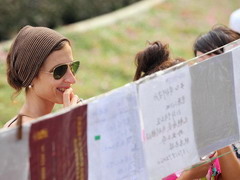Learning about better decisions
(China Daily) Updated: 2014-09-12 07:34They were certainly quick off the mark.
Just one day after President Xi Jinping said it was a pity Chinese literary classics were being removed from some school textbooks, the education authorities in Beijing announced they have considerably increased the proportion of classical poems and essays in school textbooks. Starting next school year, such content in the textbooks for first-graders will almost triple.
The Ministry of Education promised to "more carefully" implement Xi's instructions and, like he said, truly "embed such classics in students' brains".
Such responsiveness and efficiency are not only impressive; they're phenomenal.
Doubts about and opposition to the removal have been loud and prevalent in the process of "textbook reform". And long-standing. Yet education authorities had been strangely reticent, as if the content of the textbooks were none of their business. Or they don't really care what gets printed.
We cannot but be amazed at how an otherwise oblivious non-issue in their eyes has skyrocketed in significance and become the top priority overnight - literally.
We are not unfamiliar with the playbook of Chinese officialdom. We know the infamous collective irresponsibility. We also know the formidable efficiency they can display in life-or-death scenarios.
But we are talking about education, about textbooks, not disaster relief.
Something that entails an unambiguous stance and meticulous preparation and feasibility studies and extensive discourse.
If the Education Ministry is truly serious about the matter, as its spokesperson claimed on Wednesday, it shouldn't have shilly-shallyed when local authorities began abandoning Chinese literary classics.
If they genuinely share the belief that literary classics are essential to the education of the nation's youth, it is even more perplexing. Why have they waited until after the most powerful man in the country expressed his personal dissatisfaction before jumping up with same sentiment?
They are the Ministry of Education, they are supposed to know that better than anyone else.
Disappointingly, the caretaker of our national education has appeared muddle-headed over the years in both reform of the education system and textbook reforms.
The abrupt down-and-up of ancient literary classics is but one outcome of the education authorities' poor sense of direction.
Those advocating greater prominence for literary classics may congratulate themselves for the intervention of a like-minded top leader. They won.
But this is a costly triumph. One that is difficult to copy.
After all, we should not have to rely on the country's top leader to personally attend to everything.

Today I chatted with my colleague. "Have you ever sent some gifts to your child’s teacher", he asked. "Never once", I answered firmly.










